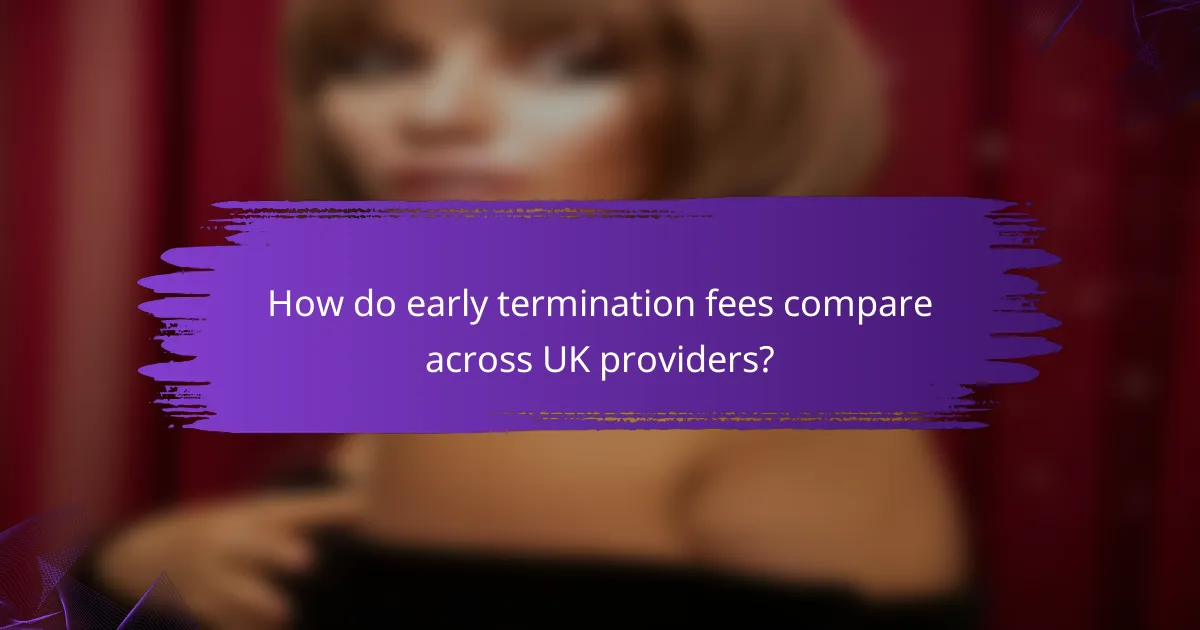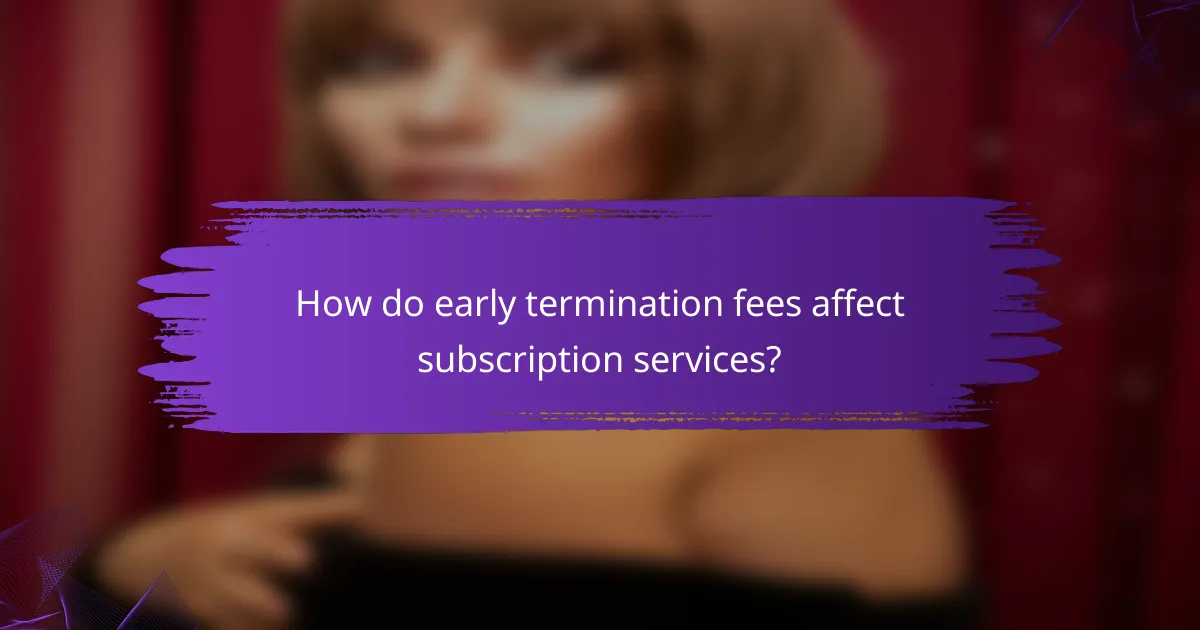Early termination fees can impose significant financial burdens on consumers in the UK, often resulting in unexpected costs when contracts are ended prematurely. Understanding the various fee structures and considering strategies to negotiate or switch providers can help mitigate these penalties and protect your financial health.

What are the risks of early termination fees in the UK?
Early termination fees in the UK can lead to significant financial burdens and affect your overall financial health. These fees are penalties imposed when a consumer ends a contract before its agreed-upon term, often resulting in unexpected costs and potential long-term implications.
Financial penalties
Financial penalties are the most immediate risk associated with early termination fees. These fees can vary widely, often ranging from a few hundred to several thousand pounds, depending on the contract terms and the remaining duration. It’s crucial to read the fine print of any agreement to understand the specific penalties involved.
In many cases, the fee may be calculated based on the remaining months of service multiplied by a set rate. For instance, if a contract has six months left and the fee is £50 per month, you could face a £300 penalty for early termination.
Impact on credit score
Terminating a contract early can negatively impact your credit score, especially if the fee remains unpaid. Providers may report missed payments or defaults to credit agencies, which can lower your score and affect your ability to secure loans or credit in the future.
To mitigate this risk, ensure that you settle any outstanding fees promptly. Regularly checking your credit report can help you monitor any changes and address issues before they escalate.
Loss of service benefits
Another risk of early termination is the potential loss of service benefits that come with the contract. Many agreements include perks such as discounted rates, bundled services, or loyalty rewards that are forfeited if you terminate early.
For example, if you have a mobile phone contract that includes free international calls or data, ending the contract prematurely means losing these benefits. Consider whether the immediate savings from terminating the contract outweigh the long-term value of these services.

How can I avoid early termination fees?
To avoid early termination fees, consider negotiating your contract terms, switching providers before your contract ends, or utilizing cooling-off periods. Each of these strategies can help you minimize or eliminate the financial penalties associated with ending a service agreement prematurely.
Negotiate contract terms
When entering a contract, always negotiate the terms to include provisions that allow for early termination without hefty fees. Many service providers are open to discussions, especially if you express concerns about flexibility. Aim for clauses that permit cancellation under specific circumstances, such as job relocation or financial hardship.
Additionally, inquire about trial periods or satisfaction guarantees that can provide an exit option without penalties. If the provider values your business, they may be willing to accommodate your requests to retain you as a customer.
Switch providers before contract ends
Switching providers before your contract concludes can help you avoid early termination fees, but timing is crucial. Monitor your contract’s end date and plan your transition accordingly, ideally a few weeks in advance. This way, you can set up the new service without a gap, reducing the need to pay penalties.
Some providers may offer incentives or discounts for new customers, which can offset any fees you might incur. Always check if your current provider has a loyalty program that could reduce or waive the fees if you decide to stay with them.
Utilize cooling-off periods
Cooling-off periods allow consumers to cancel certain contracts within a specified timeframe, usually ranging from a few days to a couple of weeks, without incurring fees. Familiarize yourself with the cooling-off regulations in your country, as they can vary significantly. In many cases, this applies to online services or contracts signed away from the provider’s premises.
If you change your mind shortly after signing a contract, act quickly to take advantage of this period. Ensure you follow the proper cancellation procedures outlined in the contract to avoid complications. Keeping documentation of your cancellation request is also advisable for future reference.

What are common early termination fee structures?
Common early termination fee structures include flat fee models, pro-rated fee calculations, and tiered fee systems. Understanding these structures helps consumers anticipate costs when ending contracts prematurely, allowing for more informed decisions.
Flat fee models
Flat fee models charge a fixed amount for early termination, regardless of how long the contract has been in effect. This structure is straightforward, making it easy for consumers to understand their financial obligations upfront.
For example, a mobile phone contract might impose a flat fee of $200 for cancellation, no matter if the contract is terminated after one month or eleven months. This can be beneficial for budgeting but may lead to higher costs if you terminate early in the contract term.
Pro-rated fee calculations
Pro-rated fee calculations adjust the termination fee based on the time remaining in the contract. This means the fee decreases as the contract nears its end, potentially saving consumers money if they decide to terminate early.
For instance, if a one-year service contract has a $240 early termination fee, a consumer might pay $120 if they cancel after six months. This model incentivizes consumers to stay longer but offers a fairer exit option.
Tiered fee systems
Tiered fee systems impose different fees depending on when the contract is terminated. Typically, the fee decreases in increments over time, rewarding longer commitments with lower penalties for early termination.
For example, a contract might charge $150 if terminated within the first three months, $100 if terminated between three to six months, and $50 after six months. This structure encourages consumers to remain in their contracts longer while providing a more manageable exit strategy as time progresses.

How do early termination fees compare across UK providers?
Early termination fees (ETFs) in the UK vary significantly among providers, impacting the overall cost of cancelling a contract early. Understanding these fees can help consumers make informed decisions when choosing a provider or considering contract termination.
BT early termination fees
BT’s early termination fees are typically calculated based on the remaining months of the contract multiplied by the monthly fee. For example, if you have six months left on a £30 monthly plan, the ETF would be around £180. It’s advisable to check your specific contract, as fees can differ based on promotions or package types.
BT also offers a cooling-off period where you can cancel without incurring fees, usually within 14 days of signing up. Always review your contract terms for any additional conditions that may apply.
Sky early termination fees
Sky charges early termination fees based on the remaining months of your contract, similar to BT. The fee is calculated by multiplying the remaining months by the monthly subscription cost. For instance, if you have four months left on a £40 plan, the ETF would be £160.
Sky provides a grace period of 14 days for cancellations without fees, allowing customers to change their minds shortly after signing. It’s crucial to read the fine print, as certain promotions may alter the standard fee structure.
Virgin Media early termination fees
Virgin Media’s early termination fees are also based on the remaining duration of the contract. Generally, the fee is calculated by taking the monthly fee and multiplying it by the number of months left. For example, if you have three months remaining on a £50 plan, the ETF would be £150.
Virgin Media offers a 14-day cooling-off period for new customers, during which you can cancel without incurring any fees. Always ensure to verify your contract details, as specific terms may vary based on your package or any promotional offers.

What should I consider before signing a contract?
Before signing a contract, it’s crucial to evaluate several factors that could impact your obligations and costs. Key considerations include the length of the contract, the flexibility of services offered, and the transparency of any fees associated with early termination.
Contract length
The length of a contract can significantly affect your commitment and potential costs. Longer contracts often come with lower monthly rates but may lock you in for several years, making it harder to exit without incurring fees. Consider whether you anticipate needing the service for the entire duration or if a shorter term might be more suitable.
For example, a typical contract might range from one to three years. If you choose a longer term, ensure that you are comfortable with the service and its terms for that entire period.
Service flexibility
Service flexibility refers to how easily you can adjust your contract terms or services without facing penalties. Some contracts allow you to upgrade or downgrade your plan, while others may impose strict conditions. Understanding these terms can help you avoid unexpected costs if your needs change.
For instance, a contract that permits plan changes with minimal notice is generally more favorable than one that requires a lengthy commitment or imposes high fees for adjustments.
Fee transparency
Fee transparency is essential to avoid surprises related to early termination fees or other hidden charges. Contracts should clearly outline any fees associated with breaking the agreement early, including how they are calculated. Look for contracts that provide straightforward explanations of these fees.
As a rule of thumb, fees should be reasonable and proportionate to the remaining contract value. If a contract includes vague language about fees, seek clarification or consider alternatives that offer clearer terms.

How do early termination fees affect subscription services?
Early termination fees (ETFs) can significantly impact subscription services by imposing financial penalties for canceling a contract before its end date. These fees are designed to recover costs incurred by service providers and can vary widely depending on the service type and provider.
Impact on streaming services
In the realm of streaming services, early termination fees are less common than in other sectors, as many platforms operate on a month-to-month basis. However, some services may offer discounted rates for long-term commitments, which could include ETFs if canceled early. For instance, a streaming service might charge a fee equivalent to one or two months’ subscription if you terminate a discounted annual plan prematurely.
Consumers should carefully read the terms of service before committing to long-term plans. Understanding the ETF structure can help avoid unexpected charges when deciding to switch services or cancel subscriptions.
Consequences for mobile contracts
Mobile contracts often feature early termination fees as a standard practice. These fees can range from a few hundred dollars to lower amounts depending on how much time remains on the contract. For example, if a user cancels a two-year plan after one year, they might face a fee that decreases monthly, reflecting the remaining contract duration.
To minimize costs, users should consider prepaid plans or month-to-month options that typically do not impose ETFs. Additionally, reviewing the contract details and understanding the fee structure can prevent financial surprises when changing providers or plans.
